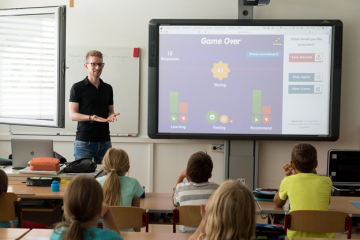Reading is crucial for success in almost every subject area covered in the school curriculum. Research has proven that it’s the main way people learn new words. As children read more regularly, they have access to more texts and learn more terms from context.
Understanding how different text types function allows youngsters to engage with the ideas presented. It also contributes to developing their critical thinking skills and helping them become better writers. Do you want to motivate your child to read? Have a look at the tips below:
1. Give Positive Feedback
Make a connection between what your youngster reads and current events. Check out the books your child is reading and provide them with active comments. You can share a case study or a journal for the child to read.
Make it a habit for him to look for books to learn new things. When your child discusses anything, you might suggest a book and offer supportive opinions. It will motivate him to read more and pay attention to your praise. It will help to develop a natural reading habit.
2. Read Together

This is achievable from the minute a child is born. Your child will learn to associate reading with having fun with the people who matter most in their lives, their parents, when you read to and with them. You can also help your child to learn different reading and writing skills.
Give your children some one-on-one reading time because kids love to be the center of attention. If you are not comfortable with books in hand, try ebooks on a phone or tablet. Share reading responsibilities. Discuss the storyline in between reading pages. Think about how it relates to actual events. Make predictions about what might happen.
3. Have Discussions About Books
This is an excellent strategy for fostering connections. It also helps in advancing learning and enhancing reading enjoyment. Discuss the book’s front cover first and what it reveals or suggests the book may be about.
Then, talk about what you have been reading and express your opinions. The early exposure to books cultivates a reading habit in them. You might discuss a new finding or an unexpected event that happened to you. You can talk about your feelings and thoughts after reading the book.
4. Arrange Fun Literary Activities
Through easy games and activities, you can help kids who are learning to read interact with words! Children love to jump on words when we use sidewalk chalk activities to practice tracing and writing outside as we play! Play games that demand you to draw connections between concepts presented in words and objects.
You can also use images to make connections, such as reading about something and then searching your home for related items. You may devise treasure hunts based on the novels you are reading. Think about utilizing pictures from your day and adding descriptions to make a book with your child.
5. Visit a Bookstore or Library
Join them on a trip to the bookstore or local library. Book shopping is a pleasurable activity that parents and children can enjoy together, in addition to teaching kids to read the back covers of books, which is vital for developing summarizing skills.
Set up routines around these outings, for example every Saturday morning the entire family reads for an hour at a park or café after picking up books. If they see you reading your children will be inspired to read, so lead by example!
6. Get into the Details
Your child will comprehend the story better if you ask questions about the characters’ feelings, actions, or thoughts. As your child attempts to speak a new word or formulate an answer, give them plenty of time, and praise them when they succeed. Make use of mistakes as a teaching opportunity.
7. Provide Books as Gifts
Don’t forget to include books when giving gift suggestions to friends and family! Every year, we distribute books as birthday and holiday gifts. Why? Giving books as gifts shows how much you value reading and want to share it with the people in your life.
Books are the perfect present for multilingual children because finding high-quality publications in minority languages may be challenging. Giving books to children makes them happy. This is one of many different ways to encourage reading to bring a fruitful outcome.
8. Put Electronics Away
It’s a good idea to turn off the TV and computer because they can overstimulate children and can’t compete with the benefits of reading. Screen use prevents reading and has negative short- and long-term effects on neurodevelopment. This recommendation also applies to parents and other caregivers’ mobile devices. Children notice when adults spend most of their free time watching YouTube and playing electronic games on a device, and they are much more likely to mimic that behavior.
The education of your child must include reading! Use the strategies listed above to encourage your youngster to read more.
Author Bio:
Pearl Holland is a skilled content producer that creates well-researched articles on a variety of subjects. She maintains a positive attitude and works with great dedication.
LinkedIn: https://www.linkedin.com/in/pearl-holland-b51886234/


